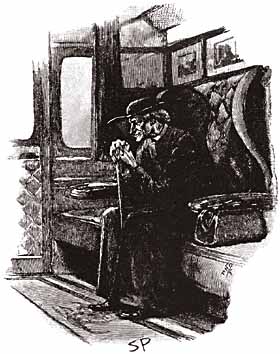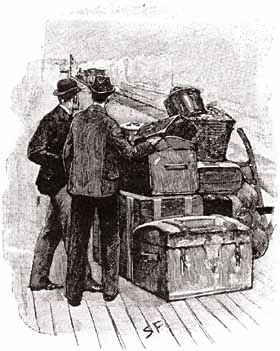In the morning I obeyed Holmes’s injunctions to the letter. A hansom was procured with such precautions as would prevent its being one which was placed ready for us, and I drove immediately after breakfast to the Lowther Arcade, through which I hurried at the top of my speed. A brougham was waiting with a very massive driver wrapped in a dark cloak, who, the instant that I had stepped in, whipped up the horse and rattled off to Victoria Station. On my alighting there he turned the carriage, and dashed away again without so much as a look in my direction. | 次の日の朝、私はホームズの指示を忠実に守った◆馬車が調達された / そのような用心で / 我々のために用意されたものを避けるために / 私は朝食後すぐに出発した / ラウザー・アーケードに向かって / その間私は最高速を出すように急がせた◆ブルーム型馬車は非常に太った御者が乗って待っていた / 黒いマントに身を包んだ / 彼は私が乗り込んだ瞬間 / 馬に鞭をくれ / ビクトリア駅に向かって発車した◆私が馬車から降りると彼は客車を返し / 私の方向をちらりとも見ないで再び走り去って行った |
So far all had gone admirably. My luggage was waiting for me, and I had no difficulty in finding the carriage which Holmes had indicated, the less so as it was the only one in the train which was marked “Engaged.” My only source of anxiety now was the non-appearance of Holmes. The station clock marked only seven minutes from the time when we were due to start. In vain I searched among the groups of travellers and leave-takers for the lithe figure of my friend. There was no sign of him. I spent a few minutes in assisting a venerable Italian priest, who was endeavouring to make a porter understand, in his broken English, that his luggage was to be booked through to Paris. Then, having taken another look round, I returned to my carriage, where I found that the porter, in spite of the ticket, had given me my decrepit Italian friend as a travelling companion. It was useless for me to explain to him that his presence was an intrusion, for my Italian was even more limited than his English, so I shrugged my shoulders resignedly, and continued to look out anxiously for my friend. A chill of fear had come over me, as I thought that his absence might mean that some blow had fallen during the night. Already the doors had all been shut and the whistle blown, when– – | ここまで全ては素晴らしくうまく行った◆荷物は私を待っていた / そしてホームズが言っていた客車を見つけるのは難しくなかった / 列車の中で「予約」と表示された客室は一つだけだったので特に簡単だった / ここでただ一つの不安の種は / ホームズが現れないことだった◆駅の時計はあと七分までに迫った / 我々の列車が発車する予定の時刻に◆探したが居なかった / 旅行者や見送りの集団の中に / 友人の敏捷な姿を◆彼の姿は影も形もなかった◆私は数分かかった / 高齢のイタリア人神父の手伝いをするのに / 彼はなんとかポーターに分からせようとしていた / 片言の英語で / 彼の荷物をパリにまで通しで運んで欲しいと◆それから / 私はもう一度見回してから / 自分の客車に戻った / そこで私はあのポーターが / 切符にも関らず / もうろくしたイタリアの友人を同伴者として置いて行っていた◆私が彼に説明するのは無駄だった / 彼がここにいるのは不法占拠だと / 私のイタリア語は彼の英語よりさらに頼りなかったので / だから私は仕方なく肩をすぼめて / ホームズの事を心配して探し続けた◆ぞっとする恐怖が私を襲った / 彼が来ないと言う事はこういう意味ではないかと考えて / 夜のうちに何らかの襲撃があったと◆すでに扉はすべて締められ、笛が吹かれていた / その時… |
 | |
“My dear Watson,” said a voice, “you have not even condescended to say good-morning.” | 「ワトソン」 / 声がした / 「おはようの挨拶もしてくれていないね」 |
I turned in uncontrollable astonishment. The aged ecclesiastic had turned his face towards me. For an instant the wrinkles were smoothed away, the nose drew away from the chin, the lower lip ceased to protrude and the mouth to mumble, the dull eyes regained their fire, the drooping figure expanded. The next the whole frame collapsed again, and Holmes had gone as quickly as he had come. | 私は押さえられない驚きで振り返った◆高齢の聖職者は私の方に顔を向けた◆その瞬間皺だらけの顔は滑らかになり / 鼻は顎の下から引き剥がされ / 飛び出していた下唇ともぐもぐした口は消え / 濁った目は輝きを取り戻し / しぼんだ体躯は広げられていた◆次の瞬間全ての体型はもう一度ひしゃげ / ホームズは現れたときと同じくらい素早く消えた |
“Good heavens!” I cried, “how you startled me!” | 「たまげた!」 / 私は叫んだ / 「驚かすなあ!」 |
“Every precaution is still necessary,” he whispered. “I have reason to think that they are hot upon our trail. Ah, there is Moriarty himself.” | 「あらゆる用心がまだ必要だ」 / 彼はつぶやいた◆「彼は我々の後を必死で追っていると考える理由がある◆あ、モリアーティがいる」 |
The train had already begun to move as Holmes spoke. Glancing back, I saw a tall man pushing his way furiously through the crowd, and waving his hand as if he desired to have the train stopped. It was too late, however, for we were rapidly gathering momentum, and an instant later had shot clear of the station. | ホームズが話している時には列車は動き始めていた◆振り返り / 私は背の高い男が群集を必死で掻き分けながら進むのが見えた / そして列車を止めたいと願うように手を振るのが◆しかし、遅すぎた / 我々の列車は急速に加速し / その直後列車は素早く駅を後にした |
“With all our precautions, you see that we have cut it rather fine,” said Holmes, laughing. He rose, and throwing off the black cassock and hat which had formed his disguise, he packed them away in a hand-bag. | 「これだけ用心して / どうにか思い通りに行ったな」 / ホームズは行った / 笑いながら◆彼は立ち上がり / 彼は変装に使っていた黒い司祭服と帽子を脱ぎ捨て / それをバッグにしまった |
“Have you seen the morning paper, Watson?” | 「朝刊を読んだか? / ワトソン」 |
“No.” | 「いや」 |
“You haven’t seen about Baker Street, then?” | 「では、ベーカー街のことも読んでいないな?」 |
“Baker Street?” | 「ベーカー街?」 |
“They set fire to our rooms last night. No great harm was done.” | 「昨夜彼らが放火したんだ◆大事には到らなかったが」 |
“Good heavens, Holmes, this is intolerable!” | 「なんだって / ホームズ / それは容赦できんな」 |
“They must have lost my track completely after their bludgeonman was arrested. Otherwise they could not have imagined that I had returned to my rooms. They have evidently taken the precaution of watching you, however, and that is what has brought Moriarty to Victoria. You could not have made any slip in coming?” | 「彼らは僕を完全に見失ったにちがいない / 棍棒の男が逮捕された後◆そうでなければ僕が自宅に戻ったと思うはずがない◆しかし彼らは君を見張るという用心をしていたようだ / それでモリアーティがビクトリア駅に来れたわけだ◆君は来る時に手違いがなかったな?」 |
“I did exactly what you advised.” | 「君の言ったとおりにした」 |
“Did you find your brougham?” | 「ブルーム馬車は見つかったか?」 |
“Yes, it was waiting.” | 「ああ / 待っていたよ」 |
“Did you recognize your coachman?” | 「御者が誰か分かったか?」 |
“No.” | 「いいや」 |
“It was my brother Mycroft. It is an advantage to get about in such a case without taking a mercenary into your confidence. But we must plan what we are to do about Moriarty now.” | 「兄のマイクロフトだ◆顔が広いのはこういう場合に有利だ / 金で雇った奴を仲間に引き入れなくてもいい◆しかしこれからモリアーティにどう対処するか計画を練らないといけない」 |
“As this is an express, and as the boat runs in connection with it, I should think we have shaken him off very effectively.” | 「これは特急だし / 船はこれに接続しているから / 僕は彼を完全に振り切ったと思うが」 |
“My dear Watson, you evidently did not realize my meaning when I said that this man may be taken as being quite on the same intellectual plane as myself. You do not imagine that if I were the pursuer I should allow myself to be baffled by so slight an obstacle. Why, then, should you think so meanly of him?” | 「ワトソン / 君は僕の行った意味が分かっていないと見える / 僕があの男は達していると言った時 / 僕と完全に同じ知能水準に◆君は想像していないだろう / もし僕が追跡者なら / こんなちょっとした障害で途方にくれるだろうとは◆では / 彼の事をそんなに貧相だと考えるべきだろうか?」 |
“What will he do?” | 「彼はどうするだろう?」 |
“What I should do.” | 「僕がするだろうことだ」 |
“What would you do, then?” | 「では君ならどうする?」 |
“Engage a special.” | 「特別列車を仕立てる」 |
“But it must be late.” | 「しかし、遅すぎるだろう」 |
“By no means. This train stops at Canterbury; and there is always at least a quarter of an hour’s delay at the boat. He will catch us there.” | 「違う◆この列車はカンタベリーで停車する / そしていつも少なくとも船を待って少なくとも十五分は遅れる◆彼はそこで追いつくだろう」 |
“One would think that we were the criminals. Let us have him arrested on his arrival.” | 「我々が犯罪者と思われる◆彼が着いたら逮捕させよう」 |
“It would be to ruin the work of three months. We should get the big fish, but the smaller would dart right and left out of the net. On Monday we should have them all. No, an arrest is inadmissible.” | 「それをすると三ヶ月の仕事が水の泡になる◆我々は大きな魚を捕らえるだろうが / 小さい魚は網から逃げてしまうだろう◆月曜になれば一網打尽にできるはずだ◆逮捕させるのは認め難い」 |
“What then?” | 「ではどうする?」 |
“We shall get out at Canterbury.” | 「我々はカンタベリーで降りる」 |
“And then?” | 「それから?」 |
“Well, then we must make a cross-country journey to Newhaven, and so over to Dieppe. Moriarty will again do what I should do. He will get on to Paris, mark down our luggage, and wait for two days at the depot. In the meantime we shall treat ourselves to a couple of carpet-bags, encourage the manufactures of the countries through which we travel, and make our way at our leisure into Switzerland, via Luxembourg and Basle.” | 「それから我々は野山を横断してニューへブンに行く / そしてディッペへと◆モリアーティはまた僕がするだろうことをやる◆彼はパリに行き / 我々の荷物を見つけ / 荷物置き場で二日は待っているだろう◆その間 / 我々は旅行鞄を二つ買って / 田舎の手工業を奨励してやろう / それを持って旅行し / スイスに余暇を楽しみに行こう / ルクセンブルグからバーゼルを通って」 |
At Canterbury, therefore, we alighted, only to find that we should have to wait an hour before we could get a train to Newhaven. | そのためカンタベリーで我々は降りたが / 一時間待たねばならないと分かった / ニューへブン行きの列車に乗るには |
I was still looking rather ruefully after the rapidly disappearing luggage-van which contained my wardrobe, when Holmes pulled my sleeve and pointed up the line. | 私はまだ寂しく急速に消えて行く荷物用車両を見ていた / 私の衣類を積み込んだ / その時ホームズが私の袖を引っ張り線路の先を指差した |
“Already, you see,” said he. | 「もう来たぞ」 / 彼は言った |
Far away, from among the Kentish woods there rose a thin spray of smoke. A minute later a carriage and engine could be seen flying along the open curve which leads to the station. We had hardly time to take our place behind a pile of luggage when it passed with a rattle and a roar, beating a blast of hot air into our faces. | 遠くに / ケント州の森の間から / 薄い煙が吹き上がっていた◆一分後 / 機関車と客車一台が / 駅に向かう開けたカーブを飛ぶようにやってくるのが見えた◆我々は間一髪荷物の後ろに隠れた / それがうなりを上げて通り過ぎた時 / 熱い突風を我々の顔に打ち付けて |
 | |
“There he goes,” said Holmes, as we watched the carriage swing and rock over the points. “There are limits, you see, to our friend’s intelligence. It would have been a coup-de-maître had he deduced what I would deduce and acted accordingly.” | 「彼が行くな」 / ホームズは言った / ポイントで客車が揺れて跳ね上がるのを見ながら◆「限界はあるようだ / 見てのとおり / 我らが友人の知能にも◆見事だったろうな / 僕が推理したとおりを彼が推理し、それにあわせて行動できていれば」 |
“And what would he have done had he overtaken us?” | 「彼が我々に追いついていればどうしただろう?」 |
“There cannot be the least doubt that he would have made a murderous attack upon me. It is, however, a game at which two may play. The question now is whether we should take a premature lunch here, or run our chance of starving before we reach the buffet at Newhaven.” | 「一片の疑いもない / 彼は僕を殺そうと襲ってきただろう◆しかし、これは二人の間の勝負だ◆現時点の問題は / ここで早い昼食をとるか / ニューへブンの食堂に着くまで空腹を我慢するかだ」 |